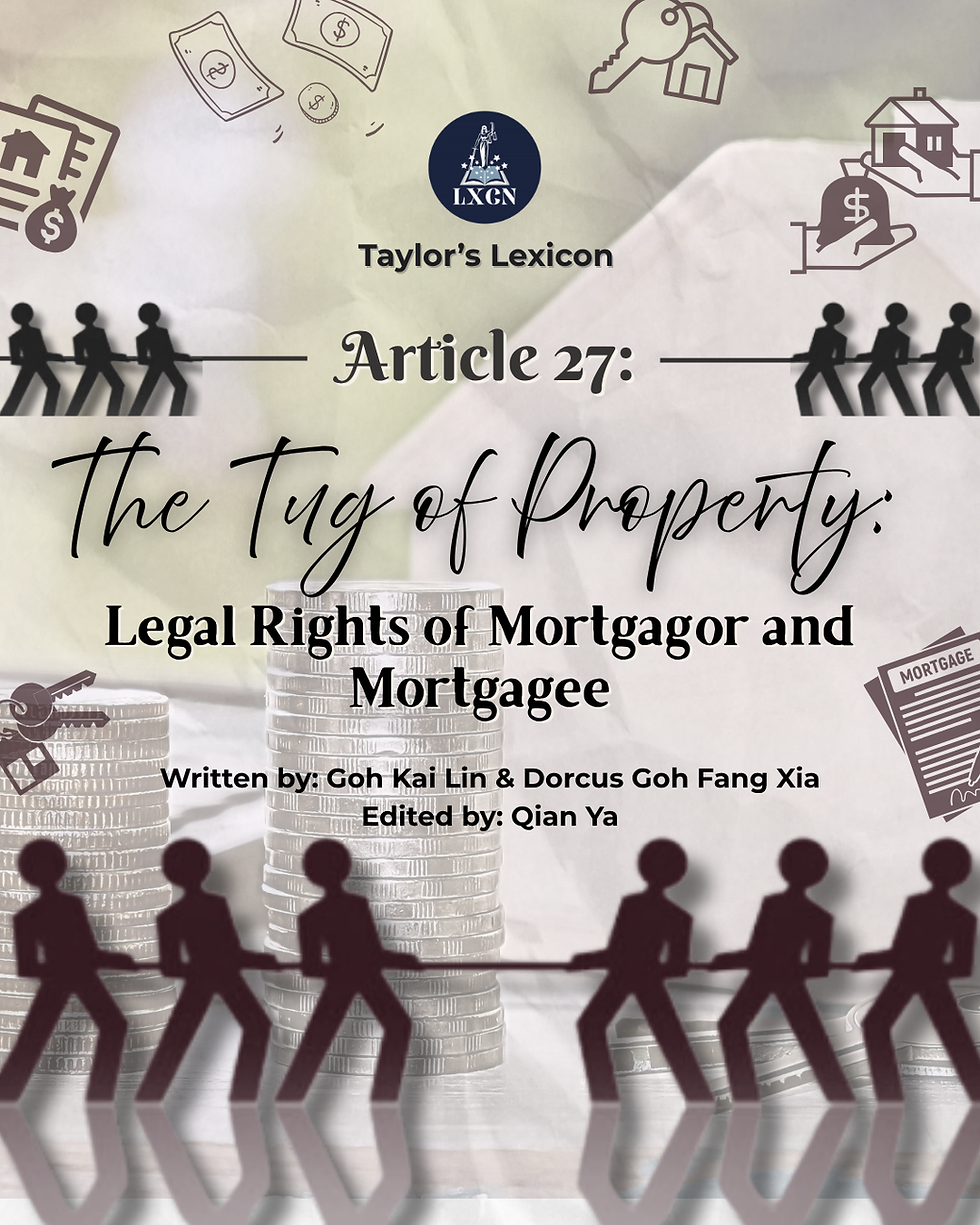The Tug of Property: Legal Rights of Mortgagor and Mortgagee
- Lexicon Editorial Board

- Jul 24, 2025
- 4 min read

Introduction
Mortgages are an essential part of property transactions, especially for individuals buying homes or businesses seeking capital. At their core, mortgages are a form of secured loan - where the borrower (mortgagor) offers property as collateral to the lender (mortgagee). The law governing mortgages in England and Wales is rooted in the Law of Property Act 1925 (LPA 1925), which distinguishes between legal and equitable mortgages.
Types of Mortgages: Legal vs Equitable
A legal mortgage is the most secure form of mortgage and must comply with strict legal formalities. According to Section 1(2)(c) and Section 85 of the LPA 1925, a legal mortgage must be created by deed, meaning it must be signed, witnessed, and delivered as a deed (as required under s1 of the Law of Property (Miscellaneous Provisions) Act 1989). As defined in Santley v Wilde, a mortgage is essentially a conveyance of land given as security for the repayment of a loan or the fulfilment of an obligation.
On the other hand, an equitable mortgage arises when these formalities are not fully met. For example, when the borrower only deposits the title deeds as security, as seen in Russell v Russell. Even without a deed, courts may still recognise the mortgage if there’s a valid contract and clear intention, applying the equitable maxim that “equity regards as done that which ought to be done,” as affirmed in Walsh v Lonsdale.
Importantly, once the loan is repaid, the mortgagor is entitled to have their property returned—an idea reinforced in Grange Side Properties v Collingwoods Securities, which upheld the principle that "once a mortgage, always a mortgage."
Rights of Mortgagor: The Equity of Redemption
The mortgagor retains a key right: the right to redeem their property. Even after missing payment deadlines, the equity of redemption allows the mortgagor to recover their property by paying off the loan - unless the property has been sold or foreclosed.
Courts are especially cautious of any terms that prevent or delay redemption, known as clogs or fetters. For instance, options to purchase the property granted to the mortgagee are often invalid if they hinder redemption, as seen in Samuel v Jarrah Timber. However, where such an option is part of a separate agreement, it may be upheld.
That said, postponing redemption is allowed, but only when it is fair. In Knightsbridge Estates v Byrne, the court upheld a 40-year postponement because both parties were in equal bargaining positions and the terms were freely agreed. In contrast, the clause in Fairclough v Swan Brewery was struck down because it made redemption practically impossible.
Further, collateral benefits, such as requiring the mortgagor to buy goods from the mortgagee must also be examined. In Biggs v Hoddinott, a five-year beer purchase agreement tied to the mortgage was upheld because it lasted only for the mortgage term and wasn’t oppressive. However, in Noakes v Rice, a similar clause was voided because it extended beyond the mortgage term, restricting the borrower’s freedom.
Courts will strike down mortgage terms that are unfair, oppressive or unconscionable, especially when there is an imbalance of power. Notably, in Cityland & Property v Dabrah, a 57% interest rate was found to be exploitative given the mortgagor’s lack of bargaining power and access to advice. By contrast, in Multiservice Bookbinding v Marden, the court upheld a mortgage with currency-linked interest because both parties had equal bargaining power and independent legal advice.
Undue influence is another concern. A mortgage may be unenforceable if the mortgagor’s consent was improperly obtained, especially in relationships involving trust, such as spouses. In Barclays Bank v O'Brien, the wife signed documents without understanding that the family home was at stake. The court held that the bank could not enforce the mortgage against her.
Rights of Mortgagee
While borrowers are protected, mortgagees (lenders) also enjoy significant rights when the mortgagor defaults.
One of the key rights is the right to possession, which can be exercised even before the loan is due, as confirmed in Four-Maids Ltd v Dudley Marshall. This allows the lender to manage the property, collect rent, or prepare it for sale.
However, courts may postpone or suspend possession under Section 36 of the Administration of Justice Act 1970 (as amended by Section 8 of the AJA 1973) if the mortgagor can show they are likely to repay the arrears within a reasonable period. In Target Home Loans v Clothier, the court granted a three-month delay based on the property’s potential to repay the loan.
Another powerful right is the statutory power of sale under Sections 101 and 103 of the LPA 1925. This allows the mortgagee to sell the property without court approval, but only after certain conditions are met. These include the loan being overdue and a formal notice being issued. The purpose is to give the lender a way to recover the debt while encouraging transparency and fairness in the process.
If, after repossession and sale, the property’s value still falls short of covering the debt, the mortgagee can sue the mortgagor directly under a personal covenant to repay, as seen in Palk v Mortgage Services Funding.
Conclusion
To conclude, the law surrounding mortgages aims to balance the rights and remedies available to both parties. While lenders are given tools to protect their financial interests, the courts have consistently ensured that borrowers are not trapped by oppressive, unfair or unconscionable terms. At the end of the day, mortgages are not just contracts. They are relationships governed by law and equity, and the courts play a crucial role in maintaining that balance.



Comments